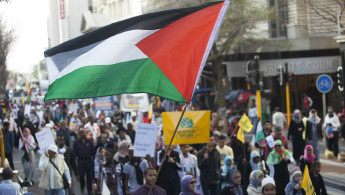South Africa Anglican Church shows solidarity with Palestine and declares Israel apartheid state
The Anglican Church in South Africa has declared Israel an "apartheid state", following a campaign by Palestinian activists.
The Christian church's Provincial Standing Committee approved a resolution on Wednesday defining Israel as an apartheid state and reviewing pilgrimages to the Holy Land.
Amnesty International, along with other NGOs, refers to the conditions Palestinians live under in Israeli occupation as being "apartheid", referring to the oppressive system of racial segregation in South Africa which was in place until 1994.
"As people of faith who are distressed by the pain of the occupation of the West Bank and Gaza - and who long for security and a just peace for both Palestine and Israel - we can no longer ignore the realities on the ground," the head of the South African Anglican Church, Archbishop Thabo Makgoba, said on his blog.
"When black South Africans who have lived under apartheid visit Israel, the parallels to apartheid are impossible to ignore. If we stand by and keep quiet, we will be complicit in the continuing oppression of the Palestinians."
The archbishop called for peace for Palestinians and Israelis but condemned the oppressive policies of successive Israeli governments, saying that they were "becoming ever more extreme".
"For Christians, the Holy Land is the place where Jesus was born, nurtured, crucified and raised. Our hearts ache for our Christian brothers and sisters in Palestine, whose numbers include Anglicans but are rapidly declining," he said in an audio message.
"People of all faiths in South Africa have both a deep understanding of what it is to live under oppression, as well as experience of how to confront and overcome unjust rule by peaceful means."
The South African church's resolution also called for outreach to Palestinian Christians, including meetings with the lay community and clerics during pilgrimages, and for attention to be drawn to the persecution of Palestinians.
"Visits to the Christians of Palestine to hear their stories are often not on the programme of these pilgrimages and, furthermore, the word 'Palestine' is never or hardly ever used in the marketing material or in the preparation for the pilgrimage," the resolution stated.
"The military occupation of Palestine is hardly ever talked about or discussed in these pilgrimages and the similarities to apartheid South Africa [are] seldom discussed."
Black South African leaders and activists in South Africa's civil rights movement have long drawn parallels between their experiences under apartheid and the conditions of Palestinians today.
After becoming president of post-apartheid South African, Nelson Mandela said: "We know too well that our freedom is incomplete without the freedom of the Palestinians."
The former leader of the South African Anglican church, Archbishop Emeritus Desmond Tutu, also repeatedly used his platform to advocate for Palestinian rights before his death in 2021.
He said that in many ways conditions for Palestinians living under Israeli occupation are worse than those endured by Black South Africans during apartheid.
"I have witnessed the systemic humiliation of Palestinian men, women and children by members of the Israeli security forces," he told the South African media in 2014.
"Their humiliation is familiar to all black South Africans who were corralled and harassed and insulted and assaulted by the security forces of the apartheid government."





 Follow the Middle East's top stories in English at The New Arab on Google News
Follow the Middle East's top stories in English at The New Arab on Google News


